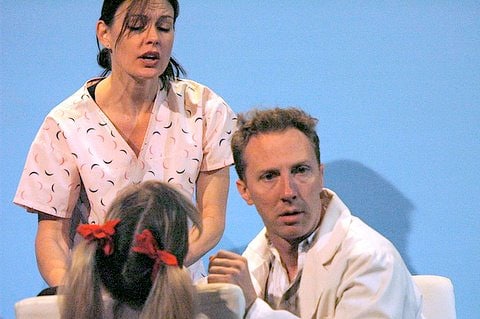NOVEMBER 2006
Click title to jump to review
THE '60S by Trish Soodik | Pacific Resident Theatre
AUTOBAHN by Neil LaBute | The Open Fist
NIGHTINGALE by Lynn Redgrave | Mark Taper Forum
PHAEDRA by Jean Racine | A Noise Within
RIDICULOUS FRAUD by Beth Henley | South Coast Repertory
O
Boom, Baby Boom
O
This is the year that Baby Boomers – born 1946 through 1964 – enter their 60s. Trish Soodik writes of this rite of passage in a new 'rheumatic' comedy. 'The 60s' is a humorous and heartfelt fly-over of that spot on the long and winding road where one couple has broken down.
With the central character right out of Moliere, his saintly wife out of the Old Testament, and his damaged son out of Arthur Miller, The 60s could be a muddle were it not for the seminal production the Pacific Resident Theatre (Venice, California) has mounted for its world premiere. Mariette Hartley, Dana Dewes and an indispensable Steve Vinovich lead a cast to make one overlook the fact that Soodik’s play, like its central character, merely flirts with serious issues in pursuit of a good time. Still, this look at the 60s is a very good time.

To be clear, this is the 60s and not the ‘60s. It’s about the decade of life, not the decade of history. The crux of the biscuit, as Zappa said, is the apostrophe. And, despite how much fun this production is, the view here of old age is pretty bleak. The three central 60-year-olds live alone and unfulfilled while a fourth has only his worn Zoloft prescription keeping him above ground.
Driving the story for better and worse is Norman’s (Vinovich) sex drive. He’s a sixty-something divorcee whose ex-wife, Grace (Hartley) – the character names reflect the yin-yang of common and divine – tolerates his need to think of her as his best friend, although she refuses to socialize with him. Still beautiful, Hartley telegraphs without trying that Grace chooses to stay connected to Norman by continuing to run the pharmacy they owned and operated through their marriage. Her willingness to work it full-time without complaint frees him to pursue beautiful young women more avidly than before it led to the break-up.

Meanwhile, their thirty-something son Adam (Kevin Rahm) is still as traumatized by his father’s behavior as Biff was by his. Adam actually might be more at home in Salesman, where he wouldn’t be constantly bumping up against Neil Simon characters unable to help him. That he eventually decides to pursue the same woman his father is helping - with equal parts Samaritan and ulterior motives – shows a bit of denial on Adam’s part. Not to mention that he only has a shot at her because Norman has stationed her in the pharmacy. This will lead to a father-son showdown in which Norman’s pathetic advances yield any moral high ground to a son who didn’t earn it.
Norman’s compulsions and denial are what is most interesting here: his conflicted feelings for his ex-wife, his immature predilection for young women (Dewes and Austin Highsmith, as well as Mariah Shipley at this performance, in for Samantha Thomson), his disinterest in his best friend’s (Jerry Sroka) woes, or what’s really eating his grumpy son. But, he’s only going to examine them if Soodik makes him. And she doesn’t.
When tragedy strikes Grace, Norman is quick to help and just as quick to get back on the prowl. A choppy time-lapse flashback section takes us back to the ‘60s – really the ‘70s, since their first conversation references a song that wasn’t popular until 1973 – for a history lesson in Norman and Grace’s high times. The flashback ends at the final tableau where, as if slipping the governor's clemency under the chamber door as the switch is pulled, Vinovich deftly redeems Norman as lights fade with a smile of willing resignation. Vinovich, with the kind of acting chops one hopes to see on such a night out, may in that sly grace note also have redeemed the play.
top of page
THE 60s
by TRISH SOODIK
directed by PAUL LINKE
PACIFIC RESIDENT THEATRE
September 24-October 15, 2006
CAST Steve Vinovich, Mariette Hartley, Jerry Sroka, William Lithgow, Dana Dewes, Kevin Rahm, Neil
McGowan, Austin Highsmith, Mariah Shipley reviewed, covering for Samantha Thomson
PRODUCTION Claire Bennett, set; Audrey Eisner, costumes; Dan Howe, lights; Jeff Henry, sound; Myrna Gawryn, choreography.
HISTORY World Premiere
Steve Vinovich, Mariette Hartley, top
O
Fugue in the key of futility
O
This is the year that Baby Boomers – born 1946 through 1964 – enter their 60s. Trish Soodik writes of this rite of passage in a new 'rheumatic' comedy. The 60s is a humorous and heartfelt fly-over of that spot down the long and winding road where one couple has broken down.
With the central character right out of Moliere, his saintly wife out of the Old Testament, and his damaged son out of Arthur Miller, The 60s could be a muddle were it not for the seminal production the Pacific Resident Theatre (Venice, California) has mounted for its world premiere. Mariette Hartley, Dana Dewes and an indispensable Steve Vinovich lead a cast to make one overlook the fact that Soodik’s play, like its central character, merely flirts with serious issues in pursuit of a good time. Still, this look at the 60s is a very good time.

To be clear, this is the 60s and not the ‘60s. It’s about the decade of life, not the decade of history. The crux of the biscuit, as Zappa said, is the apostrophe. And, despite how much fun this production is, the view here of old age is pretty bleak. The three central 60-year-olds live alone and unfulfilled while a fourth has only his worn Zoloft prescription keeping him above ground.
Driving the story for better and worse is Norman’s (Vinovich) sex drive. He’s a sixty-something divorcee
whose ex-wife, Grace (Hartley) – the character names reflect the yin-yang of common and divine –
tolerates his need to think of her as his best friend, although she refuses to socialize with him. Still beautiful, Hartley telegraphs without trying that Grace chooses to stay connected to Norman by continuing to run the pharmacy they owned and operated through their marriage. Her willingness to work it full-time without complaint frees him to pursue beautiful young women more avidly than before it led to the break-up.

Meanwhile, their thirty-something son Adam (Kevin Rahm) is still as traumatized by his father’s behavior as Biff was by his. Adam actually might be more at home in Salesman, where he wouldn’t be constantly
bumping up against Neil Simon characters unable to help him. That he eventually decides to pursue the same
woman his father is helping - with equal parts Samaritan and ulterior motives – shows a bit of denial on
Adam’s part. Not to mention that he only has a shot at her because Norman has stationed her in the
pharmacy. This will lead to a father-son showdown in which Norman’s pathetic advances yield any moral
high ground to a son who didn’t earn it.
Norman’s compulsions and denial are what is most interesting here: his conflicted feelings for his ex-wife, his immature predilection for young women (Dewes and Austin Highsmith, as well as Mariah Shipley at this performance, in for Samantha Thomson), his disinterest in his best friend’s (Jerry Sroka) woes, or what’s really eating his grumpy son. But, he’s only going to examine them if Soodik makes him. And she doesn’t.
When tragedy strikes Grace, Norman is quick to help and just as quick to get back on the prowl. A choppy
time-lapse flashback section takes us back to the ‘60s – really the ‘70s, since their first conversation
references a song that wasn’t popular until 1973 – for a history lesson in Norman and Grace’s high times.
The flashback ends at the final tableau where, as if slipping the governor's clemency under the chamber
door as the switch is pulled, Vinovich deftly redeems Norman as lights fade with a smile of willing
resignation. Vinovich, with the kind of acting chops one hopes to see on such a night out, may in that sly
grace note also have redeemed the play.

